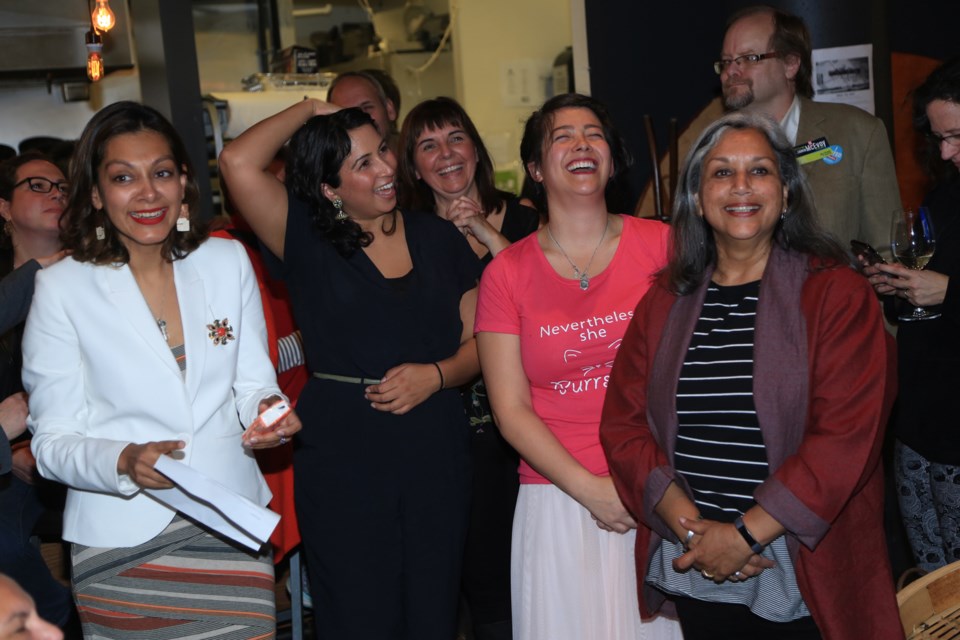Change was in the air before the final verse of Auld Lang Syne rang out on Jan. 1.
A civic election often signals a time for renewal for a city. This year’s race did not disappoint and that’s why the 2018 civic election is the Record’s News Story of the Year.
AN EARLY START
With the 2018 municipal election still months away, a new civic slate was already busy readying itself the October election. The new contender was the New Westminster Progressive Electors Coalition Society and it promised, if elected, to bring new ideas and diverse opinions to city hall.
And with longtime councillors Lorrie Williams and Bill Harper announcing they weren’t going to run again, there were at least two seats up for grabs on council.
It didn’t take long for the New West Progressives, led by founding member Daniel Fontaine, to go after the stronghold labour-endorsed councillors had on New Westminster city hall.
“We need to have different perspectives,” Fontaine told the Record in January. “We need to have some folks on council that are not all from the same political organization.”
But by the time the campaign was in full swing, it became clear the change residents wanted went deeper than political stripes.
DIVERSITY FOR THE WIN
According to 2016 census data, 39 per cent of the city’s population is from a visible minority population; taking into account the city’s 3.3 per cent Aboriginal population, that brings the total up to 42.3 per cent “non-white” residents.
But that diversity was not reflected among the city’s elected officials, and this year’s crop of candidates set out to change that.
Team Cote school board candidate Anita Ansari, whose family hails from Pakistan, told the Record during the campaign that the lack of diversity in the city’s elected officials was an important consideration for her in deciding to run.
“I have a daughter, and I want her to be able to imagine to be mayor of someplace. Whether she chooses to or not, I want the possibilities to be open for a woman of colour,” she said. New West Progressives school board candidate Cyrus Sy agreed.
“I always felt that most elected officials, especially in New Westminster, there doesn’t seem to be a lot of visible minorities,” he said. “One of the values that I have when it comes to government is that I think it should represent the community makeup. In New Westminster, 40 per cent or so are visible minorities. It only makes sense that our elected government reflects that.”
On Oct. 20, voters proved they too were looking for more diversity on city council and school board.
Visible minority candidates found their way not only into office, but to the top of the polls.
Nadine Nakagawa, a self-described millennial of Japanese descent, finished the night atop the council polls, while Ansari topped the school board race.
Nakagawa was joined on council by fellow newcomer Chinu Das.
Ansari, meanwhile, was elected to school board alongside Gurveen Dhaliwal.
Dhaliwal said, as a woman of colour, it's particularly important to her to be able to connect with a diverse community.
“When I speak to somebody in Punjabi, and I’m able to communicate the complexities of SOGI in a language they understand, then they feel connected to the school system and it’s so exciting.”
THE FUTURE IS FEMALE
Perhaps the biggest change the election brought the city was the shift from a male-dominated school board.
With incumbent trustees Jonina Campbell, Casey Cook, James Janzen, Michael Ewen and Kelly Slade-Kerr all deciding not to seek re-election, the race for school board was wide open.
By the time the dust had settled on election night there were five new faces on school board and the overwhelming majority were female.
“There’s so many women!” Dhaliwal shouted on election night.
Dhaliwal was one of five women elected to the school board. She and running mates Anita Ansari and Dee Beattie topped the polls with
Danielle Connelly, Maya Russell and Mary Lalji also joining them at the board table.
Gifford, one of seven men who ran for school trustee, was the only male candidate to win a seat on the school board.
“Mark’s going to be so surrounded by women he isn’t going to know what to do,” Beattie said on election night.
These changes say a lot about representation in politics in New Westminster, and we’re excited about what the future holds for our city.



